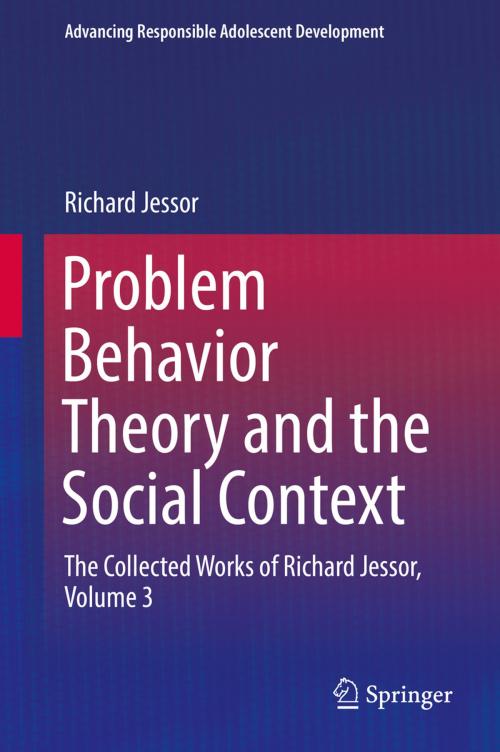Problem Behavior Theory and the Social Context
The Collected Works of Richard Jessor, Volume 3
Nonfiction, Health & Well Being, Psychology, Developmental Psychology, Social & Cultural Studies, Social Science, Crimes & Criminals, Criminology| Author: | Richard Jessor | ISBN: | 9783319578859 |
| Publisher: | Springer International Publishing | Publication: | June 19, 2017 |
| Imprint: | Springer | Language: | English |
| Author: | Richard Jessor |
| ISBN: | 9783319578859 |
| Publisher: | Springer International Publishing |
| Publication: | June 19, 2017 |
| Imprint: | Springer |
| Language: | English |
This third and final volume of Richard Jessor’s collected works explores the central role of the social context in the formulation and application of Problem Behavior Theory. It discusses the effect of the social environment, especially the social context of disadvantage and limited opportunity, on adolescent behavior, health, and development. The book examines the application of the theory in social contexts as diverse as the inner cities of the United States; the slums of Nairobi, Kenya; and the urban settings of Beijing, China. It also provides insight into how adolescents and young adults manage to “succeed”, despite disadvantage, limited opportunity, and even dangers in their everyday life settings. It illuminates how these youth manage to stay on track in school, avoid unintended pregnancy and dropout, keep clear of the criminal justice system, and remain uninvolved in heavy drug use. In addition, the book discusses the conceptual and methodological issues entailed in engaging the social context, including the role of subjectivity and meaning in an objective behavioral science; the contribution of the perceived environment in determining behavior; the continuity that characterizes adolescent growth and development; the necessity for a social-psychological level of analysis that avoids reductionism; the importance of a framework that engages the larger social environment; and the advantage of adhering to systematic theory for the explanatory generality it yields.
Topics featured in this volume include:
-
Home-leaving and its occurrence among youth in impoverished circumstances.
-
The continuity of adolescent developmental change.
-
The impact of neighborhood disadvantage on successful adolescent development.
-
Successful adolescence in the slums of Nairobi, Kenya.
-
Explaining both behavior and development in the language of social psychology.
Problem Behavior Theory and the Social Context is a must-have resource for researchers, professors, clinicians, and related professionals as well as graduate students in sociology, social and developmental psychology, criminology/criminal justice, public health, and allied disciplines.
This third and final volume of Richard Jessor’s collected works explores the central role of the social context in the formulation and application of Problem Behavior Theory. It discusses the effect of the social environment, especially the social context of disadvantage and limited opportunity, on adolescent behavior, health, and development. The book examines the application of the theory in social contexts as diverse as the inner cities of the United States; the slums of Nairobi, Kenya; and the urban settings of Beijing, China. It also provides insight into how adolescents and young adults manage to “succeed”, despite disadvantage, limited opportunity, and even dangers in their everyday life settings. It illuminates how these youth manage to stay on track in school, avoid unintended pregnancy and dropout, keep clear of the criminal justice system, and remain uninvolved in heavy drug use. In addition, the book discusses the conceptual and methodological issues entailed in engaging the social context, including the role of subjectivity and meaning in an objective behavioral science; the contribution of the perceived environment in determining behavior; the continuity that characterizes adolescent growth and development; the necessity for a social-psychological level of analysis that avoids reductionism; the importance of a framework that engages the larger social environment; and the advantage of adhering to systematic theory for the explanatory generality it yields.
Topics featured in this volume include:
-
Home-leaving and its occurrence among youth in impoverished circumstances.
-
The continuity of adolescent developmental change.
-
The impact of neighborhood disadvantage on successful adolescent development.
-
Successful adolescence in the slums of Nairobi, Kenya.
-
Explaining both behavior and development in the language of social psychology.
Problem Behavior Theory and the Social Context is a must-have resource for researchers, professors, clinicians, and related professionals as well as graduate students in sociology, social and developmental psychology, criminology/criminal justice, public health, and allied disciplines.















